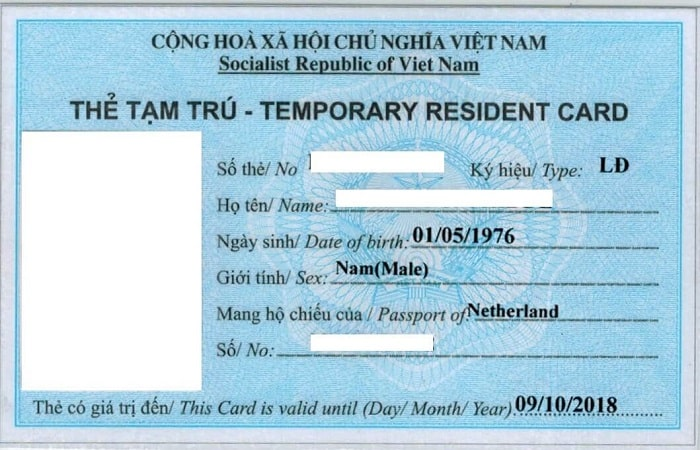Photo: VNA
While many people adhere to these regulations diligently, there are instances where individuals may inadvertently or knowingly violate immigration laws. Understanding the consequences of such violations is crucial for maintaining legal status and avoiding serious offenses. In this discussion, we will look at Article 20, Decree No. 73/2010/ND-CP to find out about them!
1. Caution or fine
A warning or fine from 100,000 VND to 200,000 VND shall be imposed for foreigners traveling within the territory of Vietnam without carrying a passport or other valid documents in lieu of a passport; Do not present your passport or other documents in lieu of a passport when requested by an authorized person for inspection.
2. Fine from 500,000 VND to 2,000,000 VND for one of the following acts:
a) Losing or damaging a passport or other valuable documents in lieu of a passport, Vietnamese visa, temporary residence card, or permanent residence card without immediately reporting it to the competent authority.
b) Erasing, deleting, modifying or falsifying the form and content recorded in the passport or other documents that have value in place of passports, visas, temporary residence cards and permanent residence cards.
c) Declare untruths to be granted passports, other valuable documents in place of passports, Vietnamese visas, temporary residence cards, permanent residence cards; Use a passport or other valid document to replace a passport that is no longer valid for entry or exit.
d) Foreigners entering prohibited areas or areas where the government requires a permit without a permit or traveling beyond the permitted scope and time limit.
d) Failure to present passport or other documents that are valid in lieu of passport or documents related to immigration when requested by Vietnamese authorities; Failure to comply with other requirements of Vietnamese authorities on checking people and luggage according to the provisions of law;
e) Foreigners who do not declare temporary residence according to regulations or use temporary residence certificates, temporary residence cards, or permanent residence cards in Vietnam for more than 15 days or less without permission from a competent authority.
g) The facility allows foreigners to stay overnight but does not transfer the content of temporary residence declaration, does not guide foreigners to declare temporary residence according to regulations or does not properly comply with other regulations of the competent authority.
3. Fine from 2,000,000 VND to 5,000,000 VND for one of the following acts:
a) Entering, exiting, or transiting without a passport, visa, or valid documents replacing passports and visas as prescribed.
b) Crossing national borders without completing exit and entry procedures according to regulations.
c) Hiding or organizing or helping others to hide in means of entry or exit for the purpose of entering Vietnam or going abroad.
d) Letting others use your passport or valuable documents instead of a passport.
d) Using passports or other valuable documents to replace another person's passport for entry, exit, or transit.
e) Foreigners do not declare temporary residence according to regulations or use temporary residence certificates, temporary residence cards, or permanent residence cards in Vietnam for more than 16 days or more without permission from competent authorities.
g) Foreigners who have been issued a permanent residence card and change their address without declaring it to have it re-issued.
4. Fine from 5,000,000 VND to 10,000,000 VND for one of the following acts:
a) Vehicle owners and drivers of vehicles transporting people entering or exiting Vietnam illegally.
b) Using fake passports, valuable documents to replace fake passports, fake visas, fake temporary residence cards, fake permanent residence cards, fake verification stamps to exit, enter, or transit.
5. Fine from 10,000,000 VND to 20,000,000 VND for the following acts:
a) Helping, harboring, concealing, creating conditions for others to go abroad, stay abroad, enter Vietnam, stay in Vietnam or cross national borders illegally.
b) Foreigners enter, practice or engage in other activities in Vietnam without permission from competent Vietnamese authorities according to the provisions of law.
c) Individuals and organizations in Vietnam sponsor or carry out procedures for foreigners to enter Vietnam, apply for visas, temporary residence cards, or extend temporary residence but do not properly carry out their responsibilities according to the provisions of the Law. law or make false statements when sponsoring, inviting or carrying out procedures for foreigners to enter the country, apply for visas, temporary residence cards, or temporary residence extensions.
6. Fine from 20,000,000 VND to 30,000,000 VND for one of the following acts:
a) Forging documents and papers to obtain a passport or other valuable documents in place of a passport, visa, temporary residence card, or permanent residence card.
b) Forging a passport or other valuable documents in place of a passport, visa, temporary residence card, permanent residence card or verification stamp.
c) Hiding into an embassy, consulate or headquarters of an international agency or organization located in Vietnam.
d) Foreigners residing in Vietnam without permission from competent authorities.
d) Organizing, guiding or brokering for others to leave or enter Vietnam illegally.
7. Additional penalties:
Confiscate passports, valuable papers in lieu of passports, exhibits, and vehicles for acts specified in Clauses 1, 2, 3, 4, 5 and Clause 6 of this Article.
